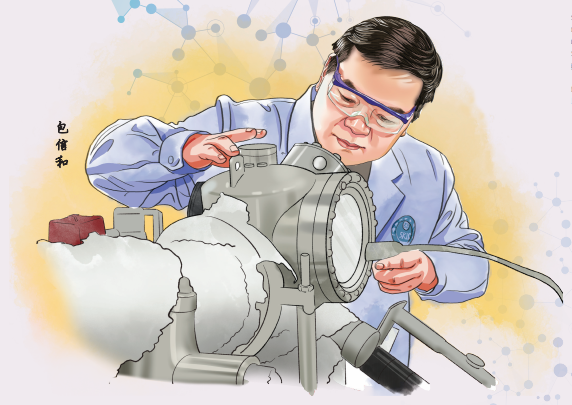Bao Xinhe, 63

Bao Xinhe, 63 [Illustration by Yang Liu and Li Xiaotian]
A world-renowned chemical physicist who specializes in basic research on catalysts and its creation, process and industrial applications. He is an academician at the Chinese Academy of Sciences, the Academy of Sciences for the Developing World and an honorary fellow of the Royal Society of Chemistry in United Kingdom.
Bao is currently the president of the University of Science and Technology of China. He received the first prize of the 2020 State Natural Science Award, China's highest academic accolade for basic sciences, for his groundbreaking work on "nanoconfined catalysis".
Passion, communication, unyielding curiosity and a keen eye for detail, along with decades of rigor ous hard work, are some of the secrets that led to Bao Xinhe and his team discovering a new type ofcatalysis that holds promising industrial applications in fields of energy, oil refining, advanced materials and other sectors. The concept of "nano-confined catalysis" provides important guidance on the design of highly efficient catalysts, which are defined as substances that facilitate chemical reactions without undergoing any permanent chemical changes themselves.
"The key to making efficient chemical reactions with less environmental and energy impact lies in a deep understanding of reaction mechanisms," Bao said.
"However, we don't always know how the reactants are converted into products, and what will come out in the end. It functions like a black box. The nanoconfined catalysis concept can shed some light on this, leading to more precise and controllable chemical reactions."
One major application of the nano-confined catalysis concept is the creation of a new type of catalyst that can directly convert carbon monoxide and hydrogen derived from coal gasification into light olefins without using a lot of water and energy, Bao said. This creates a new path to the efficient industrial development of water and energy-saving coal chemicals.
Another application of the concept is a catalyst designed to clean traces of carbon monoxide from hydrogen at room temperature, thus preventing the gas from deactivating the precious metal catalysts found in hydrogen-oxygen fuel cells, Bao said.
"People think that breakthroughs are made by a sudden stroke of genius, but in reality, making discoveries requires the long-term accumulation of knowledge and sharp intuition, so you can spot the tiniest anomalies and design the right experiments to rigorously probe the mechanisms behind them," he added.
For example, Bao's colleagues and students often contact him late at night to discuss the details of experiments and their results.
With a strong emphasis on attention to detail, basic science and communication, Bao's lab has become a cradle of quality chemists, training more than 100 PhD students and more than 40 post-doctorate researchers.
"China is rich in coal but lacking in petroleum, so the effective and clean conversion of coal and natural gas into chemicals and other products is a matter of national importance," Bao said. "Basic research should target key scientific questions that affect socioeconomic issues."








